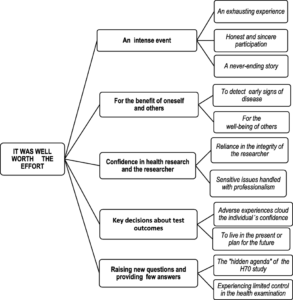
Why is it important to include participants as partners?
Longitudinal population-based cohort studies that assess health-related exposure outcomes can provide important knowledge about the needs of older adults, and are critical to our understanding of the aging process. Listening to the voice of research participants is not new in ageing research. It is, however, important to distinguish between older adults as the subjects of research and older adults as partners in the research process. While issues of engagement can be similar, the relationship is quite different – involving older adults in decisions about the research process is about a shift in power – it is about building partnership.
At present, we know relatively little about the priorities of older adults and the possible problems they experience when they participate in longitudinal population-based studies. Therefore, our study aimed to explore older adults’ motives, understandings and experiences regarding participating in the Gothenburg H70 Birth Cohort Studies (the H70 study) – multidisciplinary epidemiological studies examining representative birth cohorts of older populations in Gothenburg, Sweden, since 1971.
How did we perform the study?
Thirty-eight 70-year-old participants from the H70 study participated in nine focus groups to discuss what made them agree to participate in the study and their experiences of the health examinations and questions, the self-report assessments they were asked to fill out, and the information that they had received prior to, during, and after the study.
Yes, it was worth it!
The results showed that the H70 study was experienced on the one hand as intense, exhausting, and never-ending, and on the other hand as interesting, rewarding, challenging and beneficial – both for oneself and for others. Although the participants had critical opinions about the study as a whole, the results showed that they trusted the purpose of the study and the intentions of the researchers responsible for it. Research shows that trust is considered an essential prerequisite for involvement in health research.
What’s new?

According to the focus groups, taking part in the H70 study was motivated by a perception that it would grant the participants access to thorough and systematic health examinations that they otherwise would not have access to due to their advanced age and seemingly ageist priorities in the Swedish healthcare system. If participation in research is a way to gain access to treatment, we must be concerned about the context in which decisions on research participation are made, as well as the consequences this will have for research participation.
The participants also experienced limited control over the examinations, feeling that the information that they were given was insufficient, and that the purpose of various tests was hard to understand. This resulted in participants still having unanswered questions even while participating in the study. The H70 study is a complex environment that poses major challenges for participants’ ability to understand and use health information.
Some questions were also considered sensitive and difficult to answer. For example, the participants perceived certain questions as ageist, stereotyping and attributing certain characteristics to older adults based on their age. Other questions were perceived as heteronormative and discriminatory against all participants with other forms of sexuality and gender roles. However, our results also showed that if the participants felt safe and confident in the meeting with the person conducting the examinations, they did not find it difficult to be open and truthful when answering sensitive questions.
Practical implications
The study has provided us with knowledge concerning a number of problems that we have to consider in future follow-up examinations in the H70 study in order to ensure the quality of longitudinal studies of older adults. By including older adults as collaborators in research, their autonomy and self-determination can increase, as well as their ability to act on their own authority. For us as researchers, listening effectively to the experience and knowledge of older adults may lead to innovative lines of research, provide insight, and ensure that the research questions addressed are those that will benefit older adults the most.
In order to succeed with increased user involvement at all stages of the research process, we need to create supportive research environments with well-trained research staff that have access to the educational tools needed in order to secure the quality of the results the H70 study. This also includes development of tools needed to meet the needs of those older adults with lower health literacy.
Comments